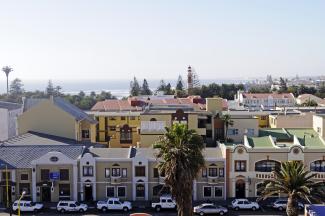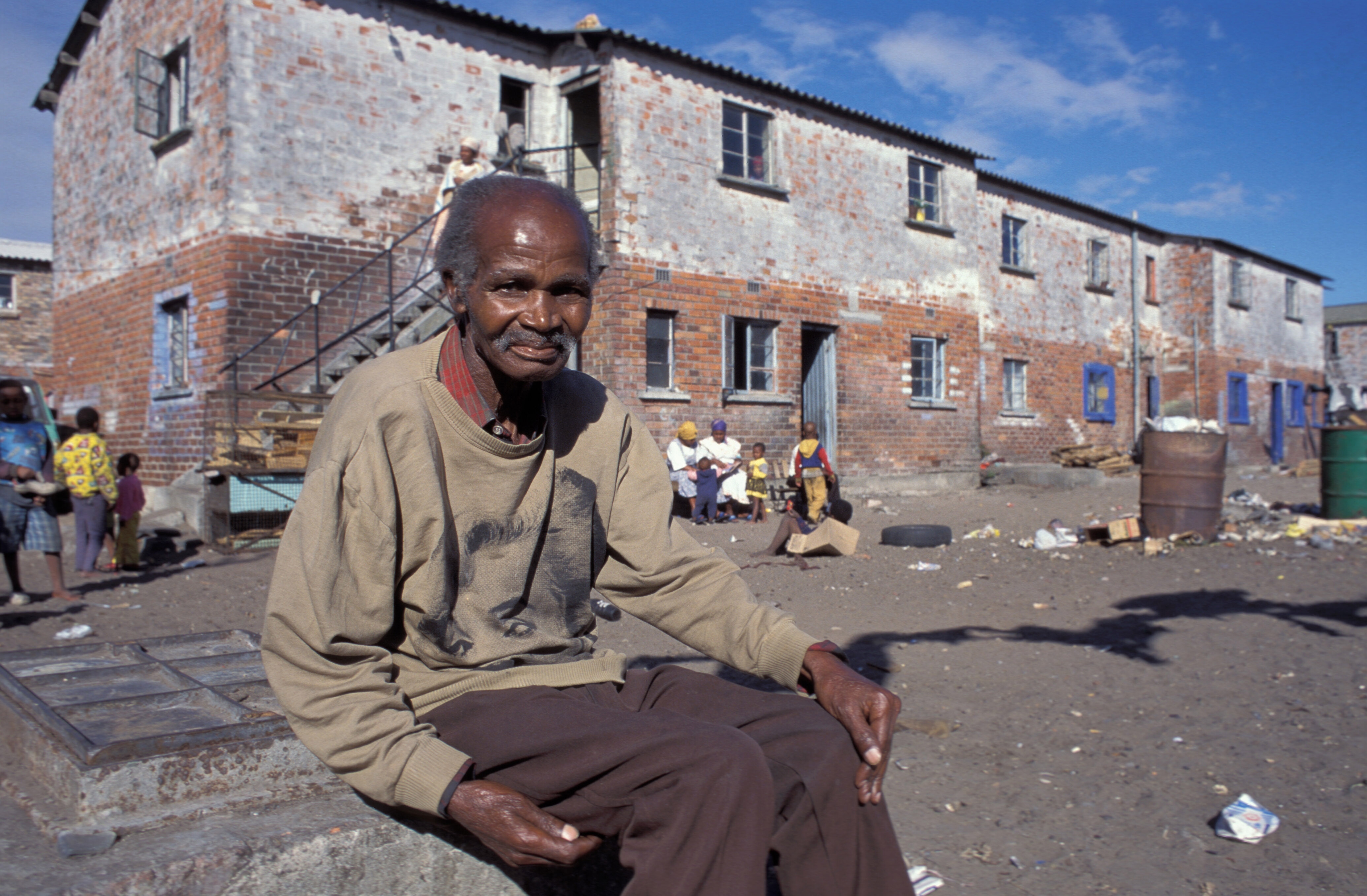Social protection
Rich region, poor people

Many African societies are marked by the abject poverty of large parts of their population. In the charter of the Southern African Development Community (SADC), social-protection measures are considered a human right, but this principle is seen as soft law or a guiding principle. Most African societies are far from implementing successful social-protection policies.
Nonetheless, most SADC countries have at least introduced pilot projects or experimented with selected forms of social-protection mechanisms or cash transfers. They are testing old-age pensions, child-support grants, disability grants, school-feeding schemes or even basic-income grants to alleviate poverty.
Great need
Old-age pensions and other social-support programmes – albeit skewed and racially grossly biased – were already introduced by the settlers’ minority regimes in South Africa, Namibia (then South West Africa) and Zimbabwe (then Rhodesia). Zimbabwe’s economic decline after the turn of the century eroded its basic social services (please note comment on p. 438). But Namibia and especially South Africa (see box on p. 426 f.), have the most advanced social policies in sub-Saharan Africa today. Even they, however, are a far cry from providing decent minimum standards of living to all citizens. Other southern African countries – Botswana, Lesotho, Malawi, Mauritius, Mozambique, Swaziland and Zambia – are experimenting with cash transfer programmes for the needy. But none of them have found a sustainable solution.
Many of the countries concerned score rather well in governance indicators: The members of the SADC (Southern African Development Community) regularly achieve the best aggregate in the Mo Ibrahim Index for good governance compared with the other African regions. Botswana, Mauritius, Namibia and South Africa are among the top runners.
Socio-economic indicators, however, are less reassuring, and the sub-region is lagging behind on most of the Millennium Development Goals (MDGs). Despite the sub-region’s relative wealth in natural resources, major segments of the population are among the poorest in the world. It has been estimated that in 2012, due to falling per capita income, about 70 % of the sub-region’s approximately 240 million people lived on two dollars a day or less. More than half of them – 40 % of the total population – had to survive on one dollar a day or less.
About half of the SADC states – including resource-rich economies such as Namibia, South Africa, Angola, Botswana and Zimbabwe, but also Lesotho and Swaziland – ranked among the countries with the world’s highest inequality rates according to the Gini coefficient. Stephen Devereux of the Institute of Development Studies (IDS) therefore concluded: “This combination of characteristics makes extensive social-protection provision both morally and economically necessary and fiscally affordable.”
Cash transfer models
Redistributive policies in Southern African countries have also started to include cash and in-kind transfers to the most vulnerable. A recent World Bank study identified more than 1,200 cash-transfer programmes (CT) in sub-Saharan Africa. It reviewed many of them, including in Botswana, Malawi, Mozambique, Namibia, South Africa and Zambia.
While CT is no panacea and can be very difficult to implement, the authors argue that “the excitement over the potential use of CTs in Sub-Saharan Africa is not unmerited”. Cash transfers are considered as a potentially important tool for development, poverty alleviation and human-rights promotion. The authors of an IMF paper similarly argue that CT “can also mitigate market failures, by bringing resources to the poor to undertake investments, which otherwise could not be financed”. They point out that CT can “be conditioned to reduce child labour and promote schooling”.
One cash-transfer model often discussed is an unconditioned basic income grant (BIG). The idea is to regularly provide each citizen with a certain amount of money as a social-security scheme, irrespective of their income. In April 2013, the Johannesburg-based Studies in Poverty and Inequality Institute (SPII) and the Ecumenical Service on South Africa (KASA) organised a conference on BIG. The participants agreed that there is a case to be made for this approach in the region.
The mining sector is making huge profits in the region. But while SADC member states often cooperate with multinational enterprises to foster job creation and attract foreign direct investment, the mining business has not translated into direct benefits for local communities. BIG schemes could serve social redistribution, but they would require the political will of those in government. Those in power, however, tend to strike deals that favour the investors.
Considering the poverty effects of climate change, the conference participants suggested that something like a Green Economy Fund could provide the funds for BIG policies. Compensation schemes could promote environmental justice to those most affected by droughts, floods or other natural disasters. Similarly, Sovereign Wealth Funds – state-owned investment funds that are fed with resource revenues – have been discussed for Africa. They too are a potential source for BIG funding.
In any case, tax policies would have to change. States need to expand the tax base, curb corruption and limit capital transfers abroad. Governments must design tax systems and social policies that do not protect the “haves” through generous provisions and relatively low taxes for high income brackets, but rather protect the “have-nots” from need.
BIG in Namibia
In recent years, Namibia drew considerable international attention through a BIG pilot project initiated by a coalition of non-state actors. This coalition was formed by the Lutheran churches, the trade unions and some other NGOs. It was established in 2005 after a government sponsored commission had recommended a BIG in 2002.
The situation in Namibia is difficult: Despite ranking as a so-called higher middle-income country, the country’s rich get richer while the poor get poorer. For instance, the monthly state pension for seniors was adjusted in mid-2013 from N$ 550 to N$ 600 (about € 50). But compared with the general price increase, pensioners are even worse off than twenty years ago. Unemployment remains high, estimated at around 35 % in general and up to 50 % among the youth.
The BIG coalition raised money mainly from German faith-based agencies. It piloted the project in a selected, much impoverished village. In the years 2008 and 2009, it paid a monthly cash allowance of N$ 100 to each resident. The campaign had hoped to convince the government that BIG contributes to empowering local communities. Since 2009 though, the initiative has been battling to secure the necessary funds and had to significantly reduce the support scheme.
Not surprisingly so, mainly the local “haves” were sceptical or openly hostile towards the idea of promoting a countrywide BIG, while those among the “have-nots” who are able to articulate their views supported the initiative. The pilot project was assessed, and several scholars of international reputation were involved. Nonetheless, the assessment results were disputed. Critics claimed they were not objective.
The assessment report was submitted in April 2009. Its conclusion was positive. “There is no doubt that the cost of a BIG is substantial – ranging from 2.2 % to 3.0 % of national income,” the authors claim. But according to their calculations, Namibia has the capacity to mobilise the necessary resources without undermining financial stability. “Over time, as Namibia benefits from the long-term growth impact, the Basic Income Grant will become increasingly more affordable. Moderate adjustments to VAT and income tax, alternatively royalties levied on natural resources, a shift in budget priorities or a combination of these interventions, will make a national BIG an immediate option for Namibia. Its implementation is thus merely a question of political will.”
Even the views of the highest ranking politicians were divided. Hifikepunye Pohamba, the current head of state and head of the governing party SWAPO, dismissed the BIG in 2010. In contrast, his designated successor to lead both country and party, Hage Geingob, the current prime minister, has openly declared his support for the BIG.
Public debate about the plight of the poor
The initiative remains controversial (see article by Rigmar Osterkamp in D+C/E+Z 2013/5 and Letters in 2013/6 and 2013/7–8). It has not managed to achieve the intended government support. Nonetheless, it provides interesting insights and evidence. The goal was to ease poverty and to offer new hope in the local community – and that cannot be dismissed lightly. BIG may indeed not be the best answer to Namibia’s structurally rooted inequality and destitution. However, it is a measurable and visible effort to create a minimum standard of living for all Namibians. It attempted to create an environment where the excluded could master their own living conditions with some degree of dignity and self-respect. Evidence indicates that it partly succeeded in doing so. In the meantime, the controversy around BIG has provoked public debate about service delivery and the plight of the poor.
Many of the seemingly pragmatic concerns about the BIG initiative are numbers games. Such statistical manoeuvring distracts from what the BIG debate is really about: if and how social justice and solidarity can be guiding principles for a caring society.
This debate is certainly not new. It goes back at least 200 years in the history of social philosophy and welfare. In his “Agrarian Justice” of 1797, Thomas Paine was in favour of creating a national fund to provide every citizen above the age of 21 with an annual financial amount independent of their other income and property. His proposal was not guided by humanitarian concerns, but by a deep sense of justice.
“Poverty,” as he diagnosed, “is a thing created by what is called civilised life”. Civilisation, he argued, “makes one part of the society more affluent, and the other more wretched, than would have been the lot in a natural state.” Therefore he stated that it was not charity he was pleading for, but justice.
We would come a long way if we were guided by fundamental principles of empathy, solidarity and social justice. These values are part of Catholic social teaching for instance. According to the Pontifical Council for Justice and Peace, solidarity “is not a feeling of vague compassion … it is a firm and persevering determination to commit oneself to the common good.”
The Catholic doctrine of subsidiarity states that poor people deserve support. While such support must neither undermine their personal capacities to help themselves, nor crowd out grassroots systems of social security, Catholicism clearly states that society must not leave the poor to themselves. Other religions similarly emphasise the dignity of underprivileged people. We don’t lack the moral compass; we must use it.
Henning Melber is director emeritus of the Dag Hammarskjöld Foundation in Uppsala, Sweden, and extraordinary professor at the University of Pretoria and the University of the Free State in Bloemfontein, South Africa. henning.melber@dhf.uu.se









